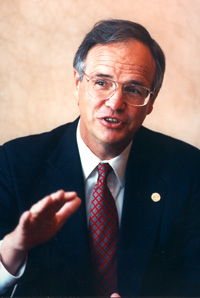
James Gustave Speth
|
lecture series on bioethics
Forestry School Dean James Gustave ("Gus") Speth will open the fall series on "Bioethics and Public Policy" with a lecture on ethics and the formulation of environmental policy.
His talk, "Sustaining the Biosphere: Thoughts on the Academy, the Environment and the New Century," will take place at 7:30 p.m. on Wednesday, Sept. 29, in the Joseph Slifka Center for Jewish Life at Yale, 80 Wall St. It is free and open to the public.
"The challenge we face as we enter [the forestry school's] second century is extraordinary, for never has the need been greater for a new generation of environmental leaders and for new ideas and insights," Speth has said.
"Environmental challenges are growing daily more serious and increasingly linked to subjects we once thought remote from our field," he notes. "Environmental leaders must be prepared to understand the international context in which many issues arise and to integrate environmental, economic and developmental concerns."
The Dean's talk marks the inauguration of the Arthur and Dale Galston Lectureship Series in Environmental Ethics, which is part of the "Bioethics and Public Policy" seminar program jointly sponsored by the Institution for Social and Policy Studies and the Slifka Center.
The seminar program, now in its fifth year, features speakers who are experts in science and are concerned with the ethical implications of their work for society. The seminars focus on three areas: medicine, genetics and the environment. The lectures on the environment were recently endowed by an anonymous donor in honor of Arthur W. Galston, the Eaton Professor Emeritus of Botany at the School of Forestry & Environmental Studies (F&ES), and his wife, Dale, who have helped organize and run the bioethics seminars for the past five years. The theme of this fall's series is "Ethical Dilemmas at the Millennium."
Before assuming the F&ES deanship in July, Speth was administrator of the United Nations Development Program, the U.N.'s principal arm for the funding and coordination of technical assistance and development. He held that post from 1993 to 1999.
Prior to his tenure at the U.N., he founded the World Resources Institute (WRI) in 1982 and served as its president until January 1993. Based in Washington, D.C., WRI is a center for policy research and technical assistance on environmental and development issues. Following his tenure at WRI, Speth was senior adviser to President-elect Clinton's transition team, heading the group on natural resources, energy and the environment.
Before founding WRI, Speth chaired President Carter's Council on Environmental Quality, and then went on to teach environmental and constitutional law for two years as a professor at Georgetown University. From 1970 to 1977, he was senior attorney with the Natural Resources Defense Council, an organization he cofounded. Prior to that, he was law clerk to Supreme Court Justice Hugo Black.
Speth graduated summa cum laude from Yale College in 1964 and earned a J.D. from the Law School in 1969. He also attended Oxford University as a Rhodes Scholar, earning a M.Litt. in economics. He recently received an honorary doctor of laws degree from Clark University.
T H I S
Bulletin Home
 W E E K ' S
W E E K ' S S T O R I E S
S T O R I E S![]()
 Visit from Treasury Secretary launches new International Center for Finance
Visit from Treasury Secretary launches new International Center for Finance
![]()
![]()
 Ethics of stem cell research to be explored
Ethics of stem cell research to be explored![]()
![]()
 Little-used Yale Library books get state-of-the-art care at off-campus shelving facility
Little-used Yale Library books get state-of-the-art care at off-campus shelving facility![]()
![]()
 Symposium and exhibit mark 'Celebration of Very Young Children and Books at Yale'
Symposium and exhibit mark 'Celebration of Very Young Children and Books at Yale'![]()
![]()
 Gus Ranis forging unions, exploring borders at YCIAS
Gus Ranis forging unions, exploring borders at YCIAS![]()
![]()
 Forestry school dean will open lecture series on bioethics
Forestry school dean will open lecture series on bioethics![]()
![]()
 Symposium explores themes in 'The Brothers Karamazov'
Symposium explores themes in 'The Brothers Karamazov'![]()
![]()
 Former V.P. of European Commission named visiting scholar at Yale SOM
Former V.P. of European Commission named visiting scholar at Yale SOM![]()
![]()
 Philanthropist and builder Frederick P. Rose '44E dies
Philanthropist and builder Frederick P. Rose '44E dies![]()
![]()
 Astronomers say universe expanding faster than once thought
Astronomers say universe expanding faster than once thought![]()
![]()
 Scientists unravel 'yin' and 'yang' of how salmonella uses proteins to spark disease
Scientists unravel 'yin' and 'yang' of how salmonella uses proteins to spark disease![]()
![]()
 Chemist to study potential benefits of sea sponge molecule with $150,000 grant
Chemist to study potential benefits of sea sponge molecule with $150,000 grant![]()
![]()
 First winners of Frederick Douglass Book Prize named
First winners of Frederick Douglass Book Prize named![]()
![]()
 Fall lecture series commemorates Brazilian writer Jorge Luis Borges
Fall lecture series commemorates Brazilian writer Jorge Luis Borges![]()
![]()
 Scholars will share views on modernist art and photographyn
Scholars will share views on modernist art and photographyn![]()
![]()
 Paul Kennedy to open book discussion series
Paul Kennedy to open book discussion series![]()
![]()
 Professor to demonstrate his new OCTI game
Professor to demonstrate his new OCTI game![]()
![]()
 Employee Day at the Yale Bowl
Employee Day at the Yale Bowl![]()
![]()
 . . . In the News . . .
. . . In the News . . .![]()
 |
| Visiting on Campus
Visiting on Campus |
| Calendar of Events
Calendar of Events |
| Bulletin Board
Bulletin Board![]()
Classified Ads |
| Search Archives
Search Archives |
| Production Schedule
Production Schedule |
| Bulletin Staff
Bulletin Staff![]()
Public Affairs Home |
| News Releases
News Releases |
| E-Mail Us
E-Mail Us |
| Yale Home Page
Yale Home Page